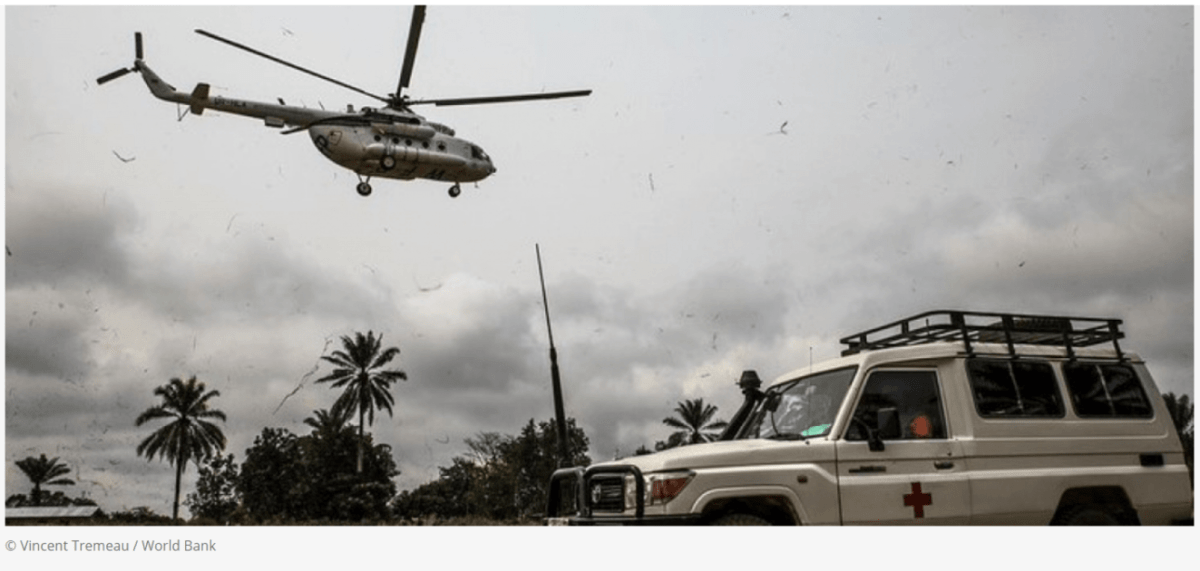By JACOB BATHANTI and DEBRA LADNER / Image Credit: World Bank
As COVID-19 (coronavirus) spreads around the world, governments and development organizations are thinking hard about how to respond effectively. Trajectories of the epidemic have varied widely among countries as governments adopt a range of policies to contain it. These efforts raise the question of what lessons we can glean from previous experiences in combating novel disease outbreaks.
We examined four case studies of epidemic response and recovery from the Global Delivery Initiative (GDI): three from past outbreaks, and one new case:
- Building a more resilient health system after Ebola in Liberia
- Financial inclusion and resilience: How BRAC’s microfinance program recovered from the West Africa Ebola crisis
- How Nigeria’s Centre for Disease Control contained Lassa Fever, 2015-2017 (Forthcoming)
- The Republic of Korea’s First 70 Days of Responding to the COVID-19 Outbreak
GDI case studies trace the implementation of development interventions, focusing on delivery challenges (the non-technical problems that impede interventions from achieving their hoped-for results) and how practitioners address these obstacles. Examining implementation processes in context helps surface innovations to inspire practitioners facing similar challenges, since many delivery challenges recur across contexts and interventions.
In the cases we analyzed, a host of delivery challenges emerged as practitioners raced to implement effective responses.
What were the greatest challenges?
Basic infrastructure. Shortfalls of basic health infrastructure and equipment hindered Nigeria’s response to the 2015 Lassa outbreak as well as Liberia’s response to Ebola in 2014. These ranged from too few ambulances to a lack of testing capacity (at one point, Liberia’s health authorities had to send samples to Guinea to test for Ebola).
Coordination. Cooperation across a wide range of partners and stakeholders is crucial in epidemic situations. Yet such coordination can be difficult. In Liberia, the government found that international partners sometimes followed their own playbooks instead of coordinating with each other and with the government. In Nigeria, the country’s federal system added a layer of complexity, as some state governments took their responses to Lassa more seriously than others.
Organizational capacity, communication and engagement. The Liberia and Nigeria case studies documented shortages of frontline staff and technical capacity of some teams, hindering response time and impeding surveillance. As it struggled to keep ongoing microfinance programs afloat in Liberia and Sierra Leone during the 2014 Ebola crisis, development partner BRAC relied on remote communications such as Skype with its in-country staff. But communication with clients was more difficult. As a result, management sometimes had an incomplete picture of what was happening on the ground.
Lessons and reflections
What do these case studies tell us about tackling delivery challenges in an epidemic, and about creating resilient systems? We suggest four lessons that emerge from the cases
1. The importance of adaptive learning for effective responses. Learning from experience is crucial, both for effective emergency response and to rebuild for the future. Korea’s response to an outbreak of Middle East Respiratory Syndrome (MERS) in 2015 was seen as slow and opaque, but lessons from this experience have informed its effective response to the COVID-19 outbreak.
In Nigeria’s response to Lassa in 2015, the government moved quickly, spurred by memories of the recent Ebola epidemic. And Nigeria’s Centre for Disease Control (NCDC) examined past responses to Lassa fever outbreaks to improve its response through systematic learning.
2. Coordination is hard – but vital. Cooperation and coordination are urgently needed during epidemic responses. This includes coordination among government agencies, across countries, and with a host of development and international organizations.
In Liberia during the Ebola outbreak, the government found it difficult to coordinate among the many stakeholders working to combat the disease. The challenges persisted even after the outbreak and impacted efforts to strengthen the health system.
Coordination challenges can be mitigated when leaders use their convening power to bring key stakeholders together. For example, the NCDC had authority to lead disease responses and coordinate among agencies. Korea’s government moved quickly to convene and work with the private sector to develop testing.
3. Effective public engagement is essential. Communication and transparency are crucial, because public behavior and trust can have profound impacts on epidemic response. In Nigeria, a decentralized communications strategy empowered the NCDC to reach out to communities affected by Lassa fever using social media and WhatsApp.
In Korea, leaders recognized the need for transparency to build trust after MERS. Communications on COVID-19 have been proactive, with regular online updates, text messages, and a massive new call center to answer questions from the public.
4. Investments in frontline workers – and systems to support them – are critical. In Liberia, health workers were overstretched even before Ebola. After the epidemic, the government trained new cadres of community health assistants, strengthened the disease surveillance system, and invested in testing capacity. By 2018, these investments were bearing fruit, enabling the government to respond more quickly to outbreaks including Lassa, monkeypox, and meningococcal disease.
Similarly, BRAC found that supporting frontline staff throughout the Ebola crisis influenced its quick recovery in Liberia and Sierra Leone.
The Global Delivery Initiative is a partnership of over 50 organizations focused on operational insights to better understand what works in implementation.
Jacob Bathanti is an editor for the Future Development blog and Debra Ladner is Program Lead for the Global Delivery Initiative as well as Senior Knowledge Management Specialist of the World Bank.
